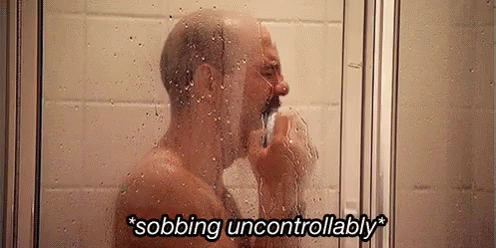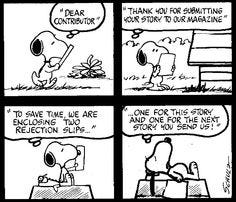
The first rule of writing is to understand, and eventually embrace the fact that there are no rules.
There are also no short-cuts. (Sorry, posers.)
Writing, like life, is ultimately all about balance. And how well you can maintain it. Or, how well you attempt to maintain it, because it’s a process, a discipline, a way of life.
For instance, one rule might be: never listen to anyone when they talk about writing, because whether it involves style or routines, one size doesn’t fit all, and part of the process is figuring out what works best (and even what works best can depend and might –and should– change depending on what’s going on in that writers’ life at any given moment).
That said, listen to everyone, because anyone who has done the work well (and perhaps those who have done it poorly and are speaking from experience, with a genuine desire to share, which qualifies as a short-cut of sorts, as we can –and should– learn from the wisdom others freely impart) has figured out something that goes beyond time and talent.
Speaking for myself, I can never get enough of writers opining on what makes them tick, describing their own successes and failures, what they recommend, what they admonish us to avoid, etc. Not all writers do this well, and I figure it’s similar to how some of the best athletes are not necessarily the best coaches. This makes sense at a meta level: it’s those that can’t do it who keenly comprehend what is lacking, while those who can do it (that combination of ineffable talent and sheer will) might not be able or necessarily inclined to figure out what it is, exactly, that they’ve managed to figure out.
Generally speaking, avoid anyone who insists you can do it if you listen to (i.e., pay) them, or anyone who treats the creative process like it’s something only certain special souls are called to engage with. It’s true that the ones who make it from dreaming to producing a book are special in the sense that anyone who puts in the time to master a craft is “special,” but anyone willing to put in that time and suffer through the necessary phases of awful to mediocre, the never-ending rejections, the humility to imitate the masters in order to cultivate an original approach (and many other things), has a chance. Art-making is, ultimately, an exclusive club, but everyone, in theory, is invited to the dance.
When it comes to the long game of serious and sustained writing, virtually every essay I’ve ever read by any celebrated author mentions persistence. Talent, yes; hard work, obviously. But the word that comes up over and over is persistence. (More on that, here.) Famous authors frequently talk about peers or students who possess unbelievable ability, but give up, get complacent, can’t handle the rejection. And the proverbial bell tolls for any writer, at any level, who can’t merely understand, but embrace the reality of rejection being the one unalterable thing. I’m unaware of any writer who doesn’t acknowledge not only that rejection is inevitable, but — if accepted and processed with a positive attitude — at times, useful. For one thing, it thickens the skin. For another, it’s not uncommon for initial failure to lead to opportunity, revision, improvement. Et cetera.
Needless to say, I know of what I speak. Oh, I know. I’ve experienced enough rejection that I can actually look back, with nostalgia, at the years when I saved each rejection slip (these were the not-so-great-old-days when writers printed poems and stories, put them in a large envelope with obligatory SASE, drove to the post office, paid to have them mailed to the desired literary magazine, and then waited weeks, or more often months, for that SASE to come back…rinse, wash, repeat), so that I might savor them once I eventually, inevitably, became a best-selling author. This was a practice I eventually discontinued, if for no other reason than to avoid being the first hoarder whose house became uninhabitable due to a pitiful topiary of rejection slips.
There are no short-cuts and few secrets, but one thing virtually every writer (and, likely, all creative artists) learns to master, beyond talent and discipline — and that thing is perseverance.
In 2015 (exactly eight years ago, today), I had the opportunity to write in some detail about a particularly memorable rejection, courtesy of The Quivering Pen, a fantastic site for writers (and readers) curated by David Abrams (himself an excellent reader and writer: check him out, here). That piece, entitled “My First Time,” is revisited below. I’d love to hear from you and your experience with rejection, especially how you’ve used it as motivation. Drop a line or leave a comment!

Let’s talk about the first.
There’s the first story I wrote. (Original story: fifth grade; vaguely plagiarized ones where, looking back and with apologies to Edgar Allan Poe, imitation was the sincerest form of flattery: third and fourth grades.)
There’s the first “adult” book I read. (Mary Shelley’s Frankenstein, fourth grade. Huge mistake. Having seen the movies and read some comic book treatments, I thought I was ready for the real thing. It took me more than halfway through to understand Frankenstein was not, in fact, the monster.)
There’s the first success. (Being asked to compose and recite an original poem for an eighth-grade student assembly.)
There’s the first readership. (A series of features I wrote for my high school newspaper. For a teenager, a printed byline is as close to the big-time as it got, at least in the old-school era before social media and blogs.)
There’s the first publication. (A poem in my college literary magazine.)
There’s the first “important” publication. (A short story in another, better-known literary magazine.)
There’s the first in a series of unfortunate events. (Also known as writing workshops, wherein the cocky writer’s work gets, well, workshopped. Hilarity does not often ensue.)
There’s the first in a longer series of ceaseless rejection. (No comment necessary.)
There’s the first short story I knew would make me famous. (It’s still unpublished.)
There’s the first attempt at a novel. (Also unpublished. Fortunately, for all involved.)
There’s the subsequent, earnest attempt at a first novel. (Still a work-in-progress. Sort of.)
Nothing especially unique or noteworthy, right? All of these events or experiences were stepping stones most, if not all, writers will recognize and relate to. There is an evolution comprised of myriad firsts (and lasts), but what separates all but the most successful and/or lucky authors is what happens after the familiar epiphanies of the apprentice have occurred and it gets to the eventual, inevitable matter of perseverance.
The “first” that was, if not unique, for me the most formative and indelible, involved rejection and resolve.
Let me tell you a story: a famous writer saw a first chapter of this aforementioned novel. Famous writer picks up phone (people still used phones in those days) and tells unknown writer that he loves the material and wants his agent to look at it. Agent receives chapter, loves it too, and asks to see entire manuscript on an exclusive basis. Unknown writer thinks: this is it, the big break, the moment of truth, and other clichés. An entire summer passes, which is unfortunate. It happens to be the same summer unknown writer’s mother — who has been battling cancer for five years — begins to lose her final battle. By the time unknown writer’s mother passes away, the novel, the agent and the famous writer are about the farthest things from his mind. On the day of mother’s funeral, unknown writer makes the ill-advised decision to check his email before leaving the house. He sees the overdue email from agent. Something tells him not to open it, but of course he has to; according to logic and everything right in the world, not to mention the imperative of Cliché, this is the perfect time to see he’s about to be represented and eventually published, and this is the miracle he’ll employ to overcome his grief, and he’ll dedicate this book to his mother, without whom he could never have written it, or written anything.
Naturally, the email is, in fact, a rather terse (but apologetic) rejection.
And this unknown writer, in spite of himself, looks past the computer, looks beyond his disbelief, and looks out to whomever or whatever may be listening (or orchestrating this test of faith) and can’t quite believe hearing the words, in a voice that sounds a lot like his: “Is that all you got?”
No, this is not going to be the final, unkindest cut, the sign that failure is inevitable, the signal that it’s better to move on to other things, the message that it’s not meant to be. I’m not doing this, he thinks, because I want to, or that I hope to prove anything, or become famous (he has put away childish things). I’m doing this, he knows, because he doesn’t know what else he could possibly do with himself. He does it, he finally understands, because there’s nothing else he could imagine himself doing. And that the only failure is to stop. To be afraid, to give up.
It wasn’t the first rejection, obviously, and while it may be the biggest, it wasn’t the last. In addition to death and taxes, writers recognize at some point, however resignedly, that rejection will always be on offer, for free, forever.
And ultimately it mattered only in the sense that it didn’t matter. Or, it mattered a great deal in the sense that it was not enough to dissuade or discourage him from stumbling down a path he made up as he went along; that revealed itself only when he looked back on another piece of writing and thought: Good thing I didn’t stop.
This was the most important first, the first day of the rest of my life.

